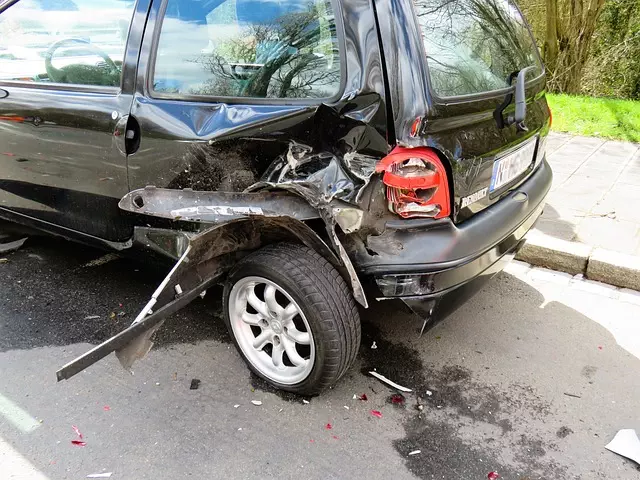Rideshare crashes in The Bronx present unique legal challenges due to differences in insurance coverage compared to nearby Queens, where comprehensive Taxi Cab Insurance Coverage Queens is standard. This disparity can leave drivers and passengers vulnerable, as policies vary widely in terms of liability and compensation for injuries or property damage. Understanding these variations is crucial for riders to ensure fair compensation and for legal professionals representing them in complex litigation involving rideshare companies like Uber or Lyft. Effective navigation of these cases requires deep knowledge of insurance policy terms and local laws governing transportation network companies, especially regarding Taxi Cab Insurance Coverage Queens.
“In the dynamic urban landscape of The Bronx, rideshare crashes have become a growing concern, leading to complex litigation. This article delves into the intricacies of rideshare crash litigation, focusing on key aspects such as taxi cab insurance coverage in neighboring Queens and its implications for all parties involved. We explore common challenges, defense strategies, and notable case studies, providing a comprehensive understanding of this evolving legal realm.”
- Understanding Rideshare Crash Litigation in The Bronx
- Taxi Cab Insurance Coverage: A Key Aspect in Queens
- Legal Implications for Involved Parties
- Common Challenges and Defense Strategies
- Case Studies: Notable Rideshare Crashes in The Bronx
Understanding Rideshare Crash Litigation in The Bronx

Rideshare crash litigation in The Bronx involves complex legal interactions between passengers, drivers, and ride-sharing companies like Uber or Lyft. When a crash occurs, understanding insurance coverage is crucial. While rideshare companies offer their own liability insurance, it’s important to know that this coverage may not fully protect all parties involved, especially when comparing it to the comprehensive Taxi Cab Insurance Coverage available in Queens.
In many cases, passengers may face significant medical bills and other damages that exceed the initial settlement offered by the ride-sharing company. This is where having a clear understanding of insurance policies becomes essential. Taxi Cab Insurance Coverage in Queens often includes higher limits for bodily injury and property damage, providing better financial protection in the event of a serious crash. Riders in The Bronx should be aware of these differences to ensure they receive adequate compensation for their injuries and losses.
Taxi Cab Insurance Coverage: A Key Aspect in Queens

In the bustling metropolis of Queens, where rideshare services are prevalent, understanding Taxi Cab Insurance Coverage is paramount for all drivers and passengers alike. Unlike some other vehicle types, taxi cabs operate in a unique legal framework, requiring specific insurance policies to mitigate risks associated with their on-demand nature. This coverage plays a crucial role in protecting both drivers and riders in the event of accidents or claims.
The insurance landscape for taxi cabs in Queens is designed to offer comprehensive protection. Policies typically include liability coverage for injuries or property damage caused during operation, as well as no-fault benefits for passengers injured in accidents. Such measures ensure that drivers and their passengers are financially secured, while also enabling them to navigate the intricate web of litigation that may arise from a crash.
Legal Implications for Involved Parties

When a rideshare crash occurs in The Bronx, legal implications can be complex and far-reaching for all involved parties. Drivers operating without a traditional Taxi Cab Insurance Coverage Queens may face significant liability if found negligent, as passengers are not typically covered under company policies during trips. This leaves drivers vulnerable to substantial personal injury lawsuits seeking compensation for damages, medical expenses, and pain and suffering.
Furthermore, the legal landscape becomes even more intricate when determining responsibility. Questions arise regarding who is insured—the rideshare company, the driver, or both—and the extent of coverage. In such cases, understanding the specific terms and conditions of insurance policies becomes crucial for mitigating risks and ensuring fair outcomes for all individuals affected by the crash.
Common Challenges and Defense Strategies

In rideshare crash litigation, common challenges include identifying the liable party—whether it’s the rideshare company or the driver, especially in cases where drivers operate both personal and commercial vehicles. Insurance coverage issues are frequently debated, particularly regarding Taxi Cab Insurance Coverage Queens, as policies can vary widely in their scope and limitations. Plaintiffs must navigate complex policy terms to establish liability and secure compensation for damages.
Defense strategies often focus on disputing fault, arguing that the driver was not acting within the course of their employment at the time of the accident or that the rideshare company had no control over the driver’s actions. They may also raise questions about the extent of injuries, relying on expert testimony and medical records to challenge the severity of claims. Effective legal representation in these cases demands a thorough understanding of insurance policies and state laws governing liability for transportation network companies.
Case Studies: Notable Rideshare Crashes in The Bronx

In the vibrant yet bustling city of The Bronx, rideshare crashes have become a significant concern, underscoring the need for robust litigation and safety measures. Case studies of notable accidents offer valuable insights into the challenges faced by passengers and drivers alike. One such incident involved a rideshare vehicle in a collision with a taxi cab, leading to severe injuries and raising questions about liability and insurance coverage. In this instance, understanding the nuances of Taxi Cab Insurance Coverage Queens becomes crucial, as it could have significantly impacted the outcome for all parties involved.
These cases highlight the complex web of responsibilities and protections within the rideshare industry. With an increasing number of rideshare companies operating in The Bronx, ensuring proper insurance coverage and safety protocols is essential. Navigating these legal intricacies can help foster a more secure environment for both passengers and drivers, minimizing the impact of future crashes and their associated litigation.
Rideshare crash litigation in The Bronx presents unique challenges, from understanding complex insurance coverage, like taxi cab insurance in Queens, to navigating legal implications and defense strategies. By examining real-world case studies of notable crashes, we gain insights into the intricacies of these cases. This knowledge equips all parties involved—from drivers to insurers—with a better understanding of their rights and responsibilities, ultimately fostering a safer and more accountable rideshare industry.
